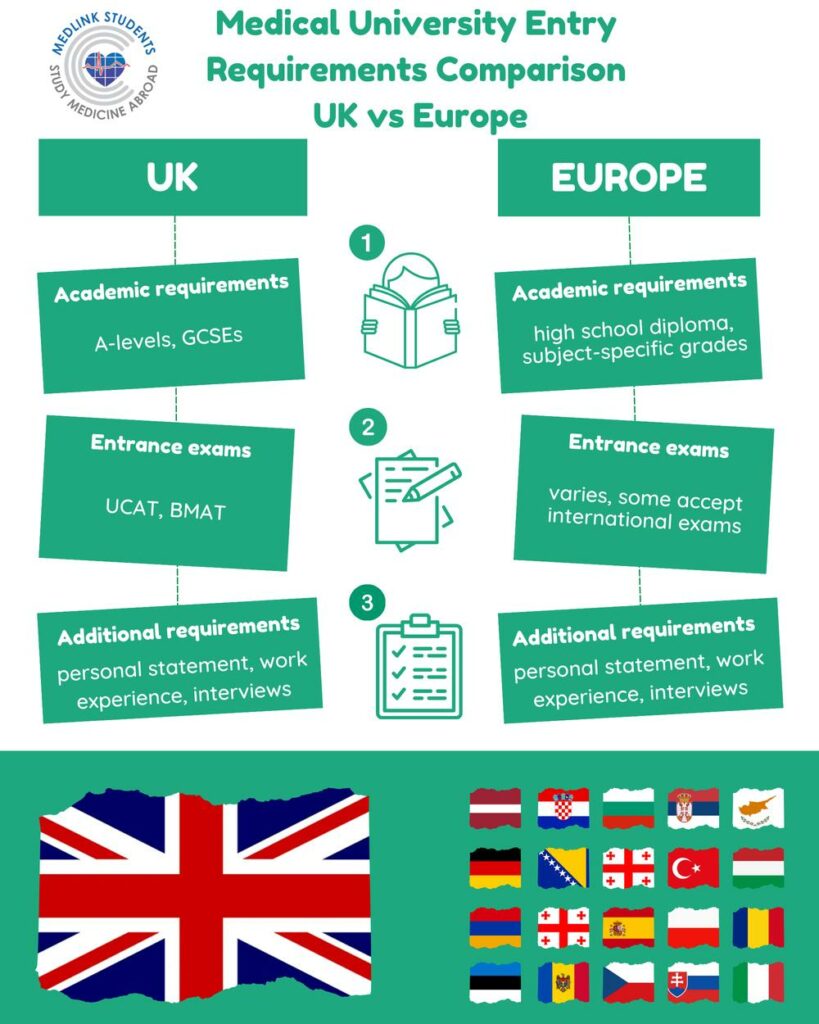UK vs Europe: Comparing Medical School Requirements and Education


Doctors throughout the world agree that choosing the right medical school is one of the most important steps to becoming a successful practitioner. So we decided to create this blog to serve as your guide toward choosing the best possible university according to your goals by providing a comprehensive comparison of 2 of the most popular destinations to study medicine.
In this article, we will tell you all about the medical school requirements and medical education systems in the UK and Europe, including the typical entry pathways into medicine, differences in curricula, and the different approaches to admission.
Key takeaways include:
- Overall, UK universities have much higher medical school requirements and are considered to be more difficult to get into, mostly due to the low number of seats available.
- UK medicine programmes follow a curriculum that is divided into 3 distinct phases, pre-clinical, clinical and rotations, whereas European medical schools have an integrated approach which combines both theoretical and practical aspects from the beginning.
- An increasing number of international students are choosing to study medicine in Europe, while the UK has seen a steady decrease in applicants.
Recent Trends in Medical Education
While the UK has traditionally been a top destination for medical studies, recent trends show a noticeable shift, with more Western students choosing to study medicine in Europe. This growing interest is mainly attributed to factors such as lower tuition fees, more accessible admissions and broader availability of English-taught programmes. For instance, Eastern European countries like Georgia, Serbia, Bulgaria, and Hungary have reported significant increases in international student enrolments.
On the other hand, the UK has seen a decline in EU student numbers, especially post-Brexit. According to the Higher Education Statistics Agency (HESA), the number of EU students enrolling in UK universities has consistently been dropping, primarily due to increased tuition fees for international students and changes in immigration policies.
If you would like to read more about how much medical education costs in the UK and in Europe, we recommend reading this comprehensive blog on the topic: Comparing The Costs of Studying Medicine.
Overview of Medical Education in the UK and Europe
In Both the UK and throughout Europe, there are 2 main pathways to becoming a doctor - going through a traditional undergraduate programme or studying via a graduate entry path into medicine.
Undergraduate Medicine
Undergraduate medicine courses are the typical way most students obtain a medical degree. These programmes are designed for high-school graduates and typically last 5-6 years.
Undergraduate Medicine Courses in the UK
Medical education in the UK is highly structured and regulated by the General Medical Council (GMC). However, no 2 degrees are exactly the same, and there are some variables from university to university.
Undergraduate courses in the UK last for 5-6 years, and students go through 3 distinct phases: Basic Sciences/Pre-clinical, Clinical, and Preparation For Practice/Specialisation. However, there are several different models that are used throughout the UK:
- 2/3+2+1 Model: used by the Universities of Oxford, Cambridge, Edinburgh, etc.
2/3 years of preclinical sciences, 2 years of clinical studies and 1 year of electives and preparation for practice. - 1+3+1 Model:
1-year introduction to medicine, 3 years combining pre-clinical and clinical sciences and 1 final year for consolidation of knowledge and electives. - 1+2+2 Model: University of Cardiff, University of East Anglia, etc.
1 year Basic Sciences, 2 years pre-clinical and clinical sciences in equal proportions and 2 years purely clinical teaching, electives and preparation for practice.
Once students graduate in the UK, they receive an MBBS (Bachelor of Medicine, Bachelor of Surgery) degree and have to go through a 2-year Foundation Programme. During this time, graduates enter paid employment and start carrying out their clinical rotations in different medical specialities with supervised practice and continuous assessments.
Undergraduate Medicine Programmes in Europe
Undergraduate medical education in Europe lasts for 6 years, but course structures can vary depending on the country and university. Many programmes also include additional lessons in the local language to help students integrate better and be ready for clinical training.
Typically, European universities use integrated curricula, which combine both theoretical and clinical teaching from the beginning. The main difference is that the first 2-3 years are focused on building both a strong theoretical foundation and preparing students for practical training through simulations, and laboratories.
After this, students go through clinical training in real-world scenarios, followed by rotations in hospitals or clinics. However, some universities, like the University of Novi Sad in Serbia, include practical training with patients much earlier in their curriculum - as early as the 2nd year.
After graduation, students in Europe receive an internationally recognised Doctor of Medicine (MD) or MBBS diploma that allows them to become a successful doctor in many countries around the world.
Medlink Students works with 100+ of the best medical schools in Europe and we offer free consultations to help students like you find the perfect university according to your goals and requirements. We are an international team of doctors and dentists with 12+ years of experience in helping thousands of students kickstart their medical or dental education.
Sign up for a free consultation with one of our expert academic advisors to get personalised guidance that will help you find the ideal destination to study medicine or dentistry.
Comparing Undergraduate Programmes UK vs Europe
Here’s a summary of the key differences between medical programmes in the UK and Europe:
| UK | Europe | |
| Course Length | 5-6 Years | 6 Years |
| Curriculum Structure | Strictly divided, usually in a 2/3+2+1 model | Integrated combining both theory and clinical |
| Preclinical Phase | 2 years focused on basic sciences | Combined with clinical from the start |
| Clinical Phase | Typically starts in year 3 and has extensive clinical rotations | Continuous clinical exposure throughout the programme |
| Language of Instruction | English | Many universities offer English-language programmes |
| Clinical Exposure | Starts in year 3, significant in final years | Starts early and continues throughout the programme |
| Degree Awarded | MBBS or equivalent | MBBS or MD |
Graduate Entry Medicine
Designed for graduates who already have a Bachelor’s degree in a science-related field. Also called fast-track or accelerated medicine programmes, these courses typically last 4 or 5 years.
Graduate Entry Medicine in the UK
In the UK prospective grad entry students should have a health science-related Bachelor's degree, although some universities also accept different types of degrees. In the UK, graduate entry lasts for 4 years and integrates both pre-clinical and clinical phases of medical education from the start.
Just like with the undergraduate programmes, students receive an MBBS degree upon graduation and have to go through a 2-year Foundation Programme.
Graduate Entry Medicine Options in Europe
The graduate entry medicine pathway in Europe allows biomedical/life science graduates and healthcare professionals with similar academic qualifications to earn a medical degree. Similarly to the UK, several universities in Europe offer standalone 4-year accelerated medicine programmes.
However, there’s also another option in which students can enter into a typical undergraduate programme but at a later stage of the course. Students get evaluated based on what subjects they’ve already studied (and other criteria we’ll cover) in their previous Bachelor’s degree and get placed in either the 2nd or 3rd year. This option is one of the main reasons why entry requirements for grad entry are typically easier in Europe, as you’re essentially joining an undergraduate programme.
After getting accepted, students carry out a typical MBBS or MD degree, depending on the university. Some of the best universities in Europe that offer graduate entry pathways into medicine include:
- The Medical University of Silesia in Poland
- University of Nicosia Medical School in Cyprus
- Pavol Jozef Safarik University in Slovakia
Medical School Entry Requirements in UK vs Europe - Undergraduate Programmes


Undergraduate Medical School Entry Requirements in the UK
UK medical schools are notorious for having really high admission criteria. Here are the typical requirements to get accepted:
- A-levels: AAA, including Chemistry and Biology. Some schools may require an additional AS level.
- GCSEs: minimum grade 6/B in English Language and Mathematics. Some schools require additional subjects and higher grades.
- Entrance exams: UCAT (University Clinical Aptitude Test) or BMAT (BioMedical Admissions Test).
- Recommended work experience in healthcare settings.
- Strong personal statement
- Strong academic references
- Participation and good performance in Multiple Mini Interviews (MMIs) or panel interviews.
- English language proficiency for non-UK candidates.
To make matters worse, there are only about 9,000 available seats for medicine students in the UK per year, and acceptance rates range between 9% to 30% in the best case.
Undergraduate Medical School Entry Requirements in Europe
Just like with medical education,.admission requirements in Europe vary depending on the country, and each university has its own admission process. Typically, prospective students will need to:
- Have a high school diploma or equivalent. Most universities will ask for high grades in Biology and Chemistry, and some may also require Mathematics or Physics.
- Entrance exams: generally, most medical schools have their own entrance exams, but there are also many universities that don’t have an exam at all. Additionally, some med schools may accept your results from the UCAT, BMAT, SAT (Scholastic Assessment Test) or MCAT (Medical College Admission Test) exams to validate that you are ready for higher education.
- English language proficiency is usually required for medicine programmes in Europe.
- A personal statement
- Interviews, if any, are usually carried out online.
Comparing Undergraduate Medicine Requirements in the UK vs Europe
| UK | Europe | |
| Academic Requirements | A-levels: AAA, including Chemistry and Biology. Some schools may require an additional AS level. | High-school diploma or equivalent. Most universities ask for high grades in Biology and Chemistry, and some may also require Mathematics or Physics. |
| GCSEs: | Minimum grade 6/B in English Language and Mathematics. Some schools require additional subjects and higher grades. | Varies by university |
| Entrance Exams | UCAT (most schools) or BMAT (some schools). | Generally, most medical schools have their own entrance exams, but some may accept results from UKCAT, BMAT, SAT, or MCAT exams. |
| English Language Proficiency | Required | Usually required |
| Work Experience | Recommended in healthcare settings. | Not typically required |
| Personal Statement | A strong personal statement is required | Personal statement or motivational letter |
| Interviews | Multiple Mini Interviews (MMIs) or panel interviews. | Usually carried out online, if required at all. |
Graduate Entry Admission Requirements UK vs Europe
Apart from having a Bachelor’s Degree, there are several other requirements to study graduate entry medicine:
Graduate Entry Requirements in the UK
To get accepted to a grad entry pathway into medicine in the UK, prospective students will need to:
- Have a Bachelor’s Degree with a minimum 2:1 (First-Class Honours) in a relevant subject.
- Take a standardised entrance exam. Accepted exams typically include the GAMSAT (Graduate Medical School Admissions Test), BMAT, or UCAT.
- Have relevant healthcare work experience.
- Submit a strong personal statement that demonstrates understanding and commitment to medicine.
- English language proficiency for non-UK applicants.
- Provide academic and professional references.
- Participate in MMIs or panel interviews.
Graduate Entry Requirements in Europe
Similarly to undergrad requirements, the criteria to get accepted to a graduate entry programme for medicine are different for each university. Typically, these include:
- A Bachelor’s Degree in a science-related field.
- Entrance exams are not always required. Some may accept submitting your results from the GAMSAT or MCAT.
- English language proficiency.
- Work experience is not always required.
- Interview participation varies between universities.
Comparing Graduate Entry Requirements in the UK vs Europe
Since some universities offer options to prospective students by joining an undergraduate programme at a later stage, grad entry medicine requirements are typically easier in Europe:
| Aspect | UK | Europe |
| Academic Requirements | Bachelor’s Degree with a minimum 2:1 (First-Class Honours) in a relevant subject. | Bachelor’s Degree in a science-related field. |
| Entrance Exams | Standardised entrance exams are required, typically GAMSAT, BMAT, or UCAT. | Entrance exams are not always required. Some universities may accept GAMSAT or MCAT results. |
| English Language Proficiency | Required | Typically required. |
| Work Experience | Relevant healthcare work experience is required. | Not always required. |
| Personal Statement | A strong personal statement is required. | Typically required |
| References | Academic and professional references are required. | Typically required. |
| Interviews | Participation in MMIs or panel interviews is required. | Interview participation varies between universities. |
Conclusion
Choosing between medical schools in the UK and Europe depends on various factors, including educational preferences, financial considerations, and career goals. While the UK provides a standardised pathway into medicine, studying abroad is much more accessible. Additionally, the availability of a large variety of medical schools gives each student the opportunity to pick out the best choice according to their personal requirements.
Ultimately, both regions provide comprehensive medical training that gives students the theoretical knowledge, practical skills and internationally recognised diplomas necessary to become successful doctors around the world. If you’re still not quite sure which option is the best for you, feel free to have a chat or schedule a call for a free consultation with one of our expert academic advisors.
Q&A: Medical School Requirements and Education: UK vs Europe
What are the main pathways to becoming a doctor in both the UK and Europe?
Both the UK and Europe offer two main pathways to becoming a doctor: traditional undergraduate courses and graduate entry programmes.
How long is medical education in the UK and Europe?
In the UK, undergraduate medical programs typically last 5-6 years, while in Europe, they generally span 6 years.
Graduate entry programmes are generally 4-years long in both the UK and across Europe. However, certain European universities offer an alternative pathway that places students into a typical undergraduate programme but at a later stage. This option can typically enter students into the 2nd or 3rd year of a 6-year programme, meaning that you may have to study for 4 or 5 years.
How does the structure of undergraduate medical education differ between the UK and Europe?
In the UK, undergraduate medical education is highly structured and typically follows the 2/3+2+1 model, with distinct phases covering basic sciences, clinical studies, and preparation for practice. On the other hand, European undergraduate programmes often use integrated curricula, combining theoretical and clinical teaching from the beginning, with a focus on practical training throughout the program.
Is it more difficult to get accepted to study medicine in the UK or Europe?
Yes, it is generally considered more difficult to get accepted to study medicine in the UK, due to the very high admission criteria. This is largely due to the fact that there is a very limited number of seats per year and only the best of the best can get in.
Are there notable differences in the clinical exposure and practical training offered between medical schools in the UK and Europe?
Yes, while clinical training in the UK often starts in year 3 with extensive rotations, European medicine courses tend to offer continuous practical training throughout the entire duration of the programme with earlier clinical exposure.
2 comments on “UK vs Europe: Comparing Medical School Requirements and Education”
Leave a Reply

About Medlink Students
Leading international recruitment company for medical students in Europe. British Council Certified Agents. 10+ years of experience and more than 10,000 students advised.









Are there any european med schools that don’t require entrance exams? That would be a great advantage for me
Yes, several European medical schools do not require entrance exams, though this varies by university. To know exactly which university best fits you and doesn't require an entrance exam, please schedule a consultation with one of our student advisors.